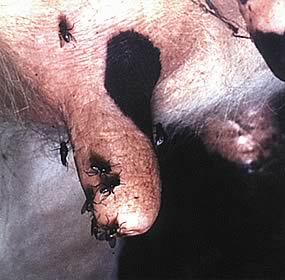12/05/06
Seeing large numbers of flies on animals or observing cows kicking
in the parlour are the main triggers for applying summer insecticide
products farmers say, but this can be too late for optimum fly
control on many farms.
‘Do not wait until you see flies on your
animals before reaching for the insecticide – treat cows
early to cut fly populations’
 |
According to an independent survey of 100 dairy farmers commissioned
by Schering-Plough Animal Health and carried out at the end of
the 2005 fly season, 44% of farmers reach for the insecticide first
only when they see flies on their cows. Another 43% only when they
see flies in the parlour or cows kicking. Only 12% plan fly treatments
based on weather conditions.
But Dr Peter Bates, senior entomologist with the VLA, says that
pre-empting the fly threat this summer will help reduce fly-borne
disease problems later in the season.
“Applying insecticide early in the season will both reduce
current fly attack and cut next generation numbers. If you can
kill flies early or even stop them feeding on your cattle, you
reduce their ability to breed. If a fly doesn’t eat, it doesn’t
develop reproductive organs.
“For example, one of the main flies that dairy farmers really
have to worry about is the head fly and the culprit known to transmit
summer mastitis. It is widespread in the UK and one breeding cycle
is enough to produce swarms for the whole summer season,” he
points out.
“Adult flies emerge in early June and lay eggs from July
onwards. The larval stage then acts as an adult reservoir, so if
you can reduce the number of adults before they start laying eggs
there will be lower fly numbers for the following year.”
Schering-Plough livestock veterinary adviser Paul Williams advises
farmers to apply insecticide early and consider two to three applications
of Coopers Spot On a season. “Trials at Bristol University
have confirmed the efficacy of Coopers Spot On in terms of reducing
the numbers of flies on cattle. It’s easy to use and works
effectively because the use of an oil-based carrier for the deltamethrin
active ingredient ensures it starts killing flies over the whole
body. Studies show flies being killed on the head, belly, legs
and rump within two hours of a single, 10ml spot application on
the back of the animal,” he points out.
 Leading
Pneumonia Antibiotic Gains License For Preventive Use Leading
Pneumonia Antibiotic Gains License For Preventive Use
 Worm
Cattle For Economic Growth This Season Worm
Cattle For Economic Growth This Season
 Protect heifers from
bovine leptospirosis Protect heifers from
bovine leptospirosis
 No
Resistance Is Main Pneumonia Antibiotic Prescription Criteria No
Resistance Is Main Pneumonia Antibiotic Prescription Criteria
|


